George Floyd’s death is a ‘watershed moment for British policing’, black police leader says
Exclusive: ‘We will look at 2020 as the year when things started to change,’ says president of National Black Police Association
George Floyd’s death has sparked a “watershed moment for British policing” and institutional racism in the UK, a representative of black officers has said.
Sergeant Tola Munro, president of the National Black Police Association (NBPA), said protests were forcing the service to confront longstanding issues over the treatment both of minority ethnic officers and the public.
“I hope that 21 years on from the Macpherson Report and 17 years on from Stephen Lawrence’s death, we may be seeing a watershed moment for British policing but also institutional racism,” he told The Independent.
“The Macpherson report didn’t just apply to policing – it applied to education, health and other areas.
“That links to what we have seen since with coronavirus and the Windrush scandal.
“All of those things could add up to a watershed moment for society and we will look at 2020 as the year when things started to change.”
Amid heightened scrutiny of the disproportionate use of force and deaths in custody, senior British police officers have issued statements condemning the killing of Mr Floyd and vowing to combat racism.
Several white chief constables have “taken the knee” in a show of solidarity with Black Lives Matter protesters.
However, some rank-and-file police officers writing on social media have claimed they are being unfairly tarred with the same brush as the US following Mr Floyd’s death, and denied that disproportionality is born of racism.
Sgt Munro said that the British model of policing by consent was “fundamentally different on almost every level to the US”, which does not have an independent complaints body.
But he urged officers to realise that the demonstrations currently sweeping the UK are “also a comment on what people are seeing locally”, adding: “We’ve got our own issues.”
The number of incidences of use of force against black suspects is disproportionate, particularly the growing deployment of Tasers, as is stop and search and the issuing of coronavirus lockdown fines.
The Home Affairs Select Committee has launched an inquiry into policing and race.
Policing tactics at some recent demonstrations, particularly in London, have come under fire following clashes where horses and the controversial tactic of “kettling” were used.
Dozens of police officers have been injured, and on Friday a 13-year-old boy admitted to attacking a Metropolitan Police constable partly because of “everything he was seeing on the news regarding Black Lives Matter”.
The most recent data shows that just under 7 per cent of police officers in England and Wales are from ethnic minorities, less than half the proportion of the general population.
Numbers are increasing slowly, mostly because of a larger proportion of non-white officers joining as new recruits.
However, there are vast differences between different groups. Of the approximately 8,300 minority ethnic officers, 42 per cent classify themselves as Asian, 30 per cent as mixed, 18 per cent as black and 11 per cent as Chinese or other.
Home Office data shows that minority ethnic officers are severely under-represented in senior ranks, and they are more likely to resign or be dismissed than their white colleagues.
Sgt Munro said the lowest staffing increases were for black women, and that several of the 43 regional police forces in England and Wales do not have any female black officers.
The officer said he had been “laughed at” when asking black women why they did not want to join the police, and believes the reluctance is down to “historic issues” and pay.
“We all need to look at that and do some more work to understand why black women are not joining policing,” he added.

“That work needs to be done on a gender basis as well as on an ethnicity basis, and we are encouraging forces to record religion as well.”
In response to a survey by the NBPA, minority ethnic officers told of being insulted by people from their own communities because of their jobs.
Martin Hewitt, chair of the National Police Chiefs’ Council, said leaders had been “appalled and horrified by the manner of Mr Floyd’s death”.
“This is a real moment in time – the questions that are being raised now, the voices being heard across the whole world and not just in the UK are causing people to question all sorts of things and look hard,” he said.
“We know there is more to do. We are still not as reflective of local communities as we want to be and there is still disproportionality in some police tactics and outcomes across the whole of the criminal justice system.
“There is a complex set of factors behind all of this disproportionality and many of those lie outside of policing.”
Mr Hewitt said the issue would not be “straightforward to solve” but added: “We want to be part of the change that people want to see on race in the UK, so we are listening hard and thinking carefully about what more we can do, and what we can do faster.
“We must all stand up to racism wherever we find it, and tackle bias and discrimination too, and we are determined that through all our forces and leadership that is precisely what we will do.”
Join our commenting forum
Join thought-provoking conversations, follow other Independent readers and see their replies
Comments
Bookmark popover
Removed from bookmarks